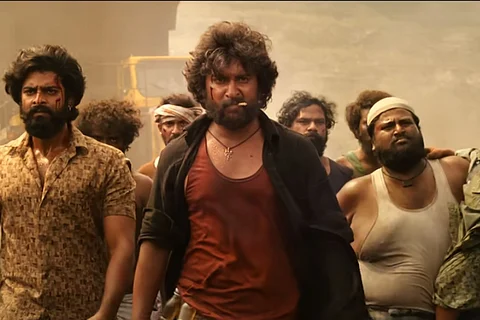

The rise of the anti-caste film in Tamil cinema, with its Dalit protagonist who hits back, has somewhat rubbed off on Telugu cinema in recent years. However, most of these attempts have lacked the ideological framework and conviction of the Tamil films. For instance, when Asuran (2019) was remade as Narappa (2021), the makers added a line that said a poor man has no caste or class. This was ironic to say the least, considering the Tamil film was based on the land rights of the Dalit people.
Dasara, directed by debut filmmaker Srikanth Odela, has Nani playing a hero from an oppressed caste, but the film gives one the impression of being a mishmash of several blockbusters from different industries. The film is set in 1995, with its protagonist Dharani (Nani) living in Veerlapally village, next to the Singareni coal mines. Nani is all swag as Dharani, walking with bottles of alcohol tied to his hip, but his look is too closely inspired by Allu Arjun’s mop of wild curls from Pushpa: The Rise (2021). You never really shake off the feeling that this is a pale imitation even though the actor gives everything he’s got for the role.
The most important place in the village is the Silk Bar, named after late actor Silk Smitha. All the men in the village seem to possess extremely tolerant livers because everyone, from the doctor to the labourers, starts the day with alcohol. The bar is also the place where the caste politics in the village plays out because the men of lowered castes have to sit outside and drink. The village – an impressive set that greatly helps the world-building – is covered in the black dust of the mines, and Dharani makes a living by stealing coal from the trains. His partner in crime is his best friend Suri (Dheekshith Shetty) who hails from a dominant caste. The third corner in this friendship triangle is Vennela (Keerthy Suresh), who belongs to the same caste as Suri.
At the heart of the film is the friendship between Suri and Dharani — it is what drives the plot forward. However, the generic bromance between the two is hardly memorable. They’re introduced in the middle of their hustle, but the VFX is a letdown. Troublingly, this supposedly epic friendship is established for the audience by one man’s willingness to 'sacrifice’ his love for Vennela because his friend also loves her. “I will marry her in our next birth,” he says with profound sadness. “What will you do if your friend falls in love with her again?” asks the listener. “I will sacrifice my love for her again,” says the weeping gent. They could have been talking about a box of gulab jamun and not a live, thinking woman who has a say in her love life. When one friend wants to kiss her, the other ties her hair to the bar of a window and makes sure his dosth accomplishes the mission. Such is his devotion.
The film consistently treats Vennela as an object to be owned, first by the good guys and then by the bad. She has a scene where she finally questions this, but the response she gets and the trajectory of the plot quickly justify everything that we’ve watched until then. Despite all this, Keerthy manages to make Vennela’s pain and anguish appear real.
For a film that overtly identifies its characters by caste, Dasara stops well short of engaging with anti-caste politics in any meaningful way. In fact, it emphasises Dharani’s ‘Hindu-ness’ by giving him a chain with a Hanuman pendant, and setting the climax (suspiciously reminiscent of Kantara in its aesthetics) in the midst of the Dasara festival with chants of ‘Jai Shri Ram’ in the background. It may seem like a subversion to have Dharani identify with Ravanan more than Ram, but this is neither new nor effective within the premise of the film and its messaging. This populist rendering glosses over the cold fact that his oppression is embedded in the religion to which he belongs — an awareness that you’ll find in the Tamil films that lead the anti-caste cinema wave.
The film has several plot threads but offers primacy to the most predictable of the lot, turning all its potential into a tired been-there-seen-it experience. Shine Tom Chacko plays Nambi, villain-in-chief. He is reliably creepy, but the actor should consider saying no to films that typecast him in such roles. Samuthirakani (with fake, protruding teeth) and Sai Kumar are sparring brothers whose rivalry is set up as fundamental to the plot, but it is little more than a distraction. Thank god for Santhosh Narayanan — his background score and songs help fill the gaps in the writing where the film obviously sags.
Nani hasn’t had a theatrical hit since 2019, and the actor seems to have sought out a script that includes all the elements that have produced blockbusters in other industries — congratulations on leaving out the item number though. There is a LOT of violence in Dasara, the gritty interval block in particular. Towards the end, you lose count of how many are maimed and killed. The blood is everywhere, and by that time, you are so desensitised that it might as well be ketchup, and you’re thinking longingly of French fries and escape.
Sowmya Rajendran writes on gender, culture, and cinema. She has written over 25 books, including a nonfiction book on gender for adolescents. She was awarded the Sahitya Akademi’s Bal Sahitya Puraskar for her novel Mayil Will Not Be Quiet in 2015.
Disclaimer: This review was not paid for or commissioned by anyone associated with the film. Neither TNM nor any of its reviewers have any sort of business relationship with the producers or any other members of its cast and crew.